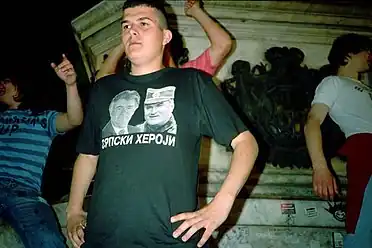Radovan Karadžić
Radovan Karadžić born 19 June 1945 in Petnjica, Montenegro, Yugoslavia was a Bosnia and Herzegovinian politician. He was in charge of part of the Bosnian Genocide. From 1995 to 2008, he was a fugitive. He was arrested on 21 July 2008 in Serbia. In 2016, he was convicted of war crimes.
Radovan Karadžić Радован Караџић | |
|---|---|
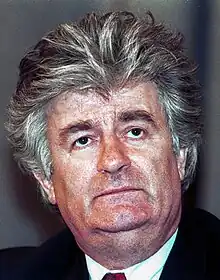 | |
| 1st President of Republika Srpska | |
| In office 7 April 1992 – 19 July 1996 | |
| Preceded by | Position established |
| Succeeded by | Biljana Plavšić |
| Personal details | |
| Born | 19 June 1945 Petnjica, SR Montenegro, SFR Yugoslavia |
| Nationality | Serb |
| Political party | SPD |
| Spouse(s) | Ljiljana Zelen Karadžić |
Early life
Karadžić was the child of Vuko and Jovanka Karadžić. His father, Vuko (1912–1987),[1][2] was a shoemaker. His mother, Jovanka (1922–2005),[3] was a peasant girl from northern Montenegro. Her maiden name was Jovanka Jakić. She married Vuko in 1943, at age twenty.[4]
Karadžić's father was in prison for most of his son's childhood. During World War II, Yugoslavia had been taken over by Nazi Germany and the other Axis countries. Karadžić's father had been a member of the Chetniks. This was an army that supported Yugoslavia's original government. Because he was in this army, he was put in prison after the war.[5]
Education
Karadžić moved to Sarajevo in 1960 to study psychiatry at the Sarajevo University School of Medicine.[6] In 1970, he studied anxiety and depression at Næstved Hospital in Denmark. From 1974 to 1975, he got more medical training at Columbia University in New York City.[7]
After he returned to Yugoslavia, Karadžić worked in the Koševo Hospital (the main hospital in Sarajevo).[8] He was also a poet. Another Serbian writer encouraged him to go into politics.[9]
Prison for fraud

While he was working in the Koševo Hospital, Karadžić made extra money in illegal ways. For example, healthcare workers who wanted to retire early would pay him to say they were disabled. Karadžić would also lie for prisoners who wanted to avoid punishment by saying they were insane when they committed their crimes.[10]
In 1983, Karadžić started working at a hospital in a suburb of Belgrade called Voždovac. With his partner, Momčilo Krajišnik, Karadžić got a loan that was meant to be used for improving agriculture. Instead, he and his partner used the money to build themselves houses in Pale. Pale was a Serb town above Sarajevo that the government had turned into a ski resort.[10]
On 1 November 1984, the two were arrested for fraud. They spent 11 months in jail before their friend Nikola Koljević paid their bail so they could get out.[9][10] On 26 September 1985, Karadžić was sentenced to three years in prison for embezzlement and fraud. However, since he had already spent over a year in prison, the court did not make Karadžić spend the rest of his sentence in prison.[11]
Political life
In 1989, Karadžić helped create the Serb Democratic Party (Srpska Demokratska Stranka) in Bosnia and Herzegovina. The party's goal was to bring together the country's Bosnian Serbs.
In September 1991, the Srpska Demokratska Stranka began to create areas in Bosnia-Herzegovina that were ruled only by Serbs. On 15 October 1991, the Bosnian parliament voted that they wanted to rule themselves. Nine days later, a separate Serb Assembly was created, to represent only the Serbs in Bosnia and Herzegovina.[12]
On 9 January 1992, the Bosnian Serb Assembly said they had created a new country: the Republic of the Serb people of Bosnia and Herzegovina. On 28 February 1992, the Serb Republic approved its constitution. It also said that it now controlled:[13]
- The areas in Bosnia-Herzegovina that were ruled only by Serbs
- Parts of Bosnia-Herezogovina where the people were mostly Serbian
- "All regions in which the Serbian people [are] a minority [because of] the Second World War genocide"[lower-alpha 1]
President of Republika Srpska
On 6 and 7 April 1992, Europe and the United States accepted that Bosnia was an independent country.[16][17] Bosnia became a member of the United Nations on 22 May 1992.[18] Karadžić was voted President of this Bosnian Serb government around 13 May 1992. His powers included being in charge of the country's army.
War crimes charges
As the head of the Bosnian Serb army, Karadžić was in charge of a campaign to get rid of all the Bosnian Muslims and Croats from villages that the Serbs wanted for themselves.[19]
In 1995, the International Criminal Tribunal for the former Yugoslavia (ICTY) indicted Karadžić for committing war crimes against non-Serbs. The ICTY accused Karadžić of ordering the Srebrenica massacre in 1995, where Karadžić's army murdered more than 7,500 Muslims.[19][20][21] They also accused him of many other crimes, including:[22][23]

- Forcing non-Serbian Muslims to leave their homes because of their ethnicity and religion
- Persecution (treating a group of people badly) because of their race, religion, or political opinions
- Murder
- Terrorism against civilians
- Taking hostages
- Extermination (trying to kill an entire population of people: all non-Serbian Muslims)
Karadžić ran away so he could not be tried for these crimes. Until 2008, he hid. The United States government offered a $5 million reward for his arrest.[24]
Arrest
Karadžić was arrested on 21 July 2008 in Belgrade.[25] He had been pretending to be a doctor of alternative medicine, mostly in Belgrade but also in Vienna, Austria.[25][26] Karadžić was sent to an ICTY jail in the Hague on 30 July.[27] Karadžić said that the United States government had protected him while he was hiding, and this was why it took over ten years for him to be found.[28][29]
Karadžić first appeared before a judge at the ICTY on 31 July 2008.[30] At that time, the ICTY had found 64 people guilty of war crimes, crimes against humanity, or genocide during the Yugoslav Wars.[31]
The film The Hunting Party was based on Karadžić's life as a fugitive.
Conviction and sentence
On 24 March 2016, Karadžić was found guilty of genocide, war crimes, and crimes against humanity. He was sentenced to 40 years in prison.[32]
Karadžić was found guilty of genocide for the Srebrenica massacre. He was also convicted of persecution, extermination, deportation, ethnic cleansing, and murder.[19]
Photo gallery
- Hover over each photo to view its label. Click on the picture to make it bigger.
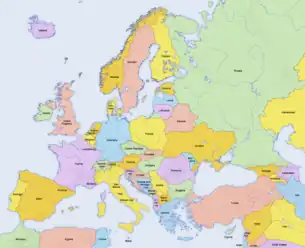
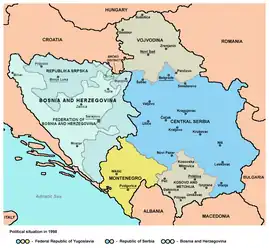 Karadžić was President of the Republika Srpska (shown in pink)
Karadžić was President of the Republika Srpska (shown in pink)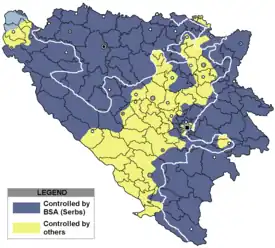 With Karadžić in charge, Serbian soldiers took over all of the blue areas on this map
With Karadžić in charge, Serbian soldiers took over all of the blue areas on this map
- Karadžić's siege of Sarajevo
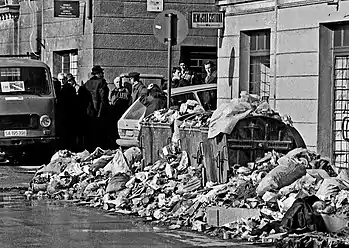 During the siege, garbage was too dangerous to collect
During the siege, garbage was too dangerous to collect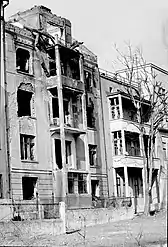
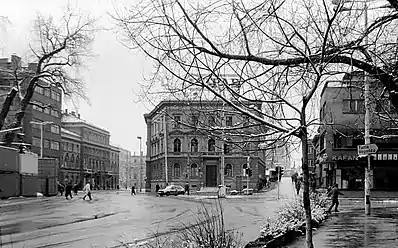
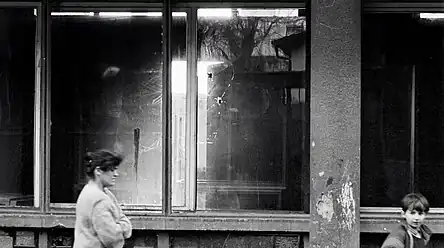 A mother and child walk along a street that Serbian soldiers have sniped
A mother and child walk along a street that Serbian soldiers have sniped
- The Srebrenica massacre
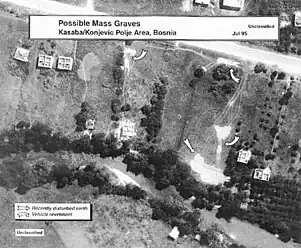 Satellite photo showing mass graves (the areas in white)
Satellite photo showing mass graves (the areas in white)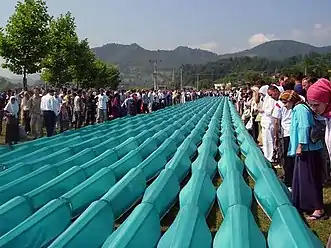
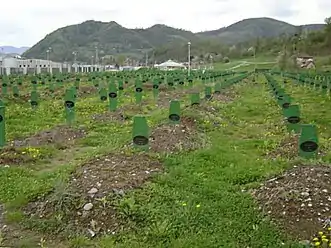 Graves for people who were re-buried after their bodies were recovered
Graves for people who were re-buried after their bodies were recovered Memorial "Wall of Names" of people killed in the massacre
Memorial "Wall of Names" of people killed in the massacre
Notes
- Scholars think that between 300,000 and 500,000 Serbs were killed during the Holocaust.[14][15] See the page Holocaust victims for more information.
References
- "Neću da pogazim reč". HOBOCTИ Online. Kompanija Novosti. 6 August 2008. Retrieved 24 March 2016.
- "Crnogorac prodao Radovana". Monitor. 2 April 2010. Retrieved 24 March 2016.
- "Umrla majka Radovana Karadžića". Index. 5 May 2015. Retrieved 24 March 2016.
- Robert J. Donia, Radovan Karadzic: Architect of the Bosnian Genocide, p. 23, Cambridge University Press, 2014, ISBN 9781107073357.
- Robert J. Donia, Radovan Karadzic: Architect of the Bosnian Genocide, p. 25, Cambridge University Press, 2014, ISBN 9781107073357.
- Robert J. Donia, Radovan Karadzic: Architect of the Bosnian Genocide, p. 27, Cambridge University Press, 2014, ISBN 9781107073357.
- "Karadzic: Psychiatrist-turned 'Butcher of Bosnia'". CNN. Cable News Network, Turner Broadcasting System, Inc. 22 July 2008. Retrieved 8 April 2016.
- Danner, Mark (1998). "The Marketplace Massacre and Radovan Karadzic." Excerpted from Danner, Mark (February 2, 1998), "Bosnia: The Turning Point," The New York Review of Books. PBS: Frontline. WGBH Educational Foundation. Retrieved 8 April 2016.
- Judah, Tim (1997). The Serbs: History, Myth and the Destruction of Yugoslavia. New Haven and London: Yale University Press. ISBN 9780300071139.
- Sudetic, Chuck (1999). Blood and Vengeance: One Family's Story of the War in Bosnia. New York: Penguin Books. ISBN 9780140286816.
- "Radovan Karadžić captured". Поԓитика (in Serbian). Serbia: Politika. Retrieved 22 July 2008.
- Gow, James (2003). The Serbian Project and Its Adversaries: A Strategy of War Crimes. Montreal: McGill-Queen's University Press. pp. 122–123. ISBN 1850654999.
- Nettelfield, Lara J. (2010). Courting Democracy in Bosnia and Herzegovina. Cambridge University Press. p. 67. ISBN 978-1-58544-226-3.
- "Croatia" (PDF). Shoah Resource Center, The International School for Holocaust Studies. Yad Vashem.
- "Žrtve licitiranja - Sahrana jednog mita, Bogoljub Kočović". NIN (in Serbian). 12 January 2006. Retrieved 8 May 2012.
- Riding, Alan (7 April 1992). "Europe Nods to Bosnia, Not Macedonia". The New York Times. Retrieved 8 April 2016.
- "A guide to the United States' history of recognition, diplomatic, and consular relations, by country, since 1776: Bosnia-Herzegovina". Office of the Historian. United States Department of State. Retrieved 8 April 2016.
- "Member States of the United Nations". United Nations. Retrieved 8 April 2016.
- Simons, Marlise (24 March 2016). "Radovan Karadzic, a Bosnian Serb, Gets 40 Years Over Genocide and War Crimes". The New York Times. Retrieved 8 April 2016.
- Annan, Kofi (11 July 2005). "'May We All Learn and Act on the Lessons of Srebrenica,' Says Secretary-General, in Message to Anniversary Ceremony". United Nations.
- "ICTY: The Conflicts". The International Criminal Tribunal for the former Yugoslavia. Retrieved 8 April 2016.
- "Prosecutor v. Radovan Karadžić: Decision on Appeal from Denial of Judgment of Acquittal for Hostage-Taking" (PDF). International Tribunal for the Prosecution of Persons Responsible for Serious Violations of International Humanitarian Law Committed in the Territory of the Former Yugoslavia since 1991. 11 December 2012. Retrieved 8 April 2016.
- "Prosecutor v. Radovan Karadžić: Public Redacted Version of Judgement Issued on 24 March 2016" (PDF). International Tribunal for the Prosecution of Persons Responsible for Serious Violations of International Humanitarian Law Committed in the Territory of the Former Yugoslavia since 1991. 24 March 2016. Retrieved 8 April 2016.
- "Wanted for War Crimes in the Former Yugoslavia: Radovan Karadzic – Up To $5,000,000 Reward". Rewards for Justice. United States Department of State. Archived from the original on 17 April 2008. Retrieved 8 April 2016.
- "Serbia captures fugitive Karadzic". BBC News. BBC. 22 July 2008. Retrieved 8 April 2016.
- Stojanovic, Dusan. "Karadzic interviewed about details of his arrest". WTOP: Washington's Top News. Associated Press. Archived from the original on 31 July 2008. Retrieved 8 April 2016.
- "Karadzic being held in same jail as Milosevic". GMA News. GMA Network, Inc. 30 July 2008. Archived from the original on 22 May 2011. Retrieved 8 April 2016.
- "Holbrooke promised no ICTY trial: Karadzic". AFP Online. Agence France-Presse. 1 August 2008. Archived from the original on 10 September 2010. Retrieved 8 April 2016.
- "US wants me dead: Karadžić". AFP Online. Agence France-Presse. 1 August 2008. Archived from the original on 20 May 2011. Retrieved 8 April 2016.
- "War criminal Radovan Karadzic captured". Radio Australia. ABC. 31 July 2008. Retrieved 8 April 2016.
- "Key Figures of ICTY Cases". International Criminal Tribunal for the former Yugoslavia. Archived from the original on 10 April 2009. Retrieved 8 April 2016.
- Hume, Tim; Ap, Tiffany; & Veselinovic, Milena (24 March 2016). "Karadzic sentenced to 40 years for genocide". CNN. Cable News Network, Turner Broadcasting, Inc. Retrieved 8 April 2016.
{{cite web}}: CS1 maint: multiple names: authors list (link)
